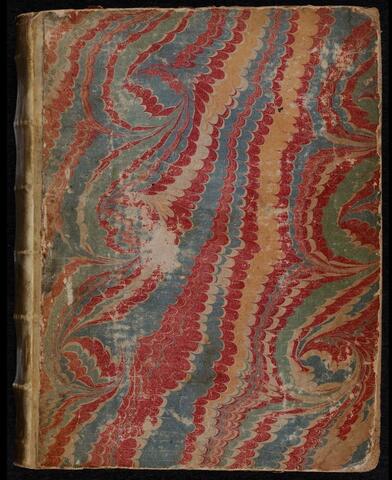
Bereich "Identifikation"
Signatur
Titel
Datum/Laufzeit
- c. 1680-1720 (Anlage)
Erschließungsstufe
Umfang und Medium
1 bound manuscript volume of 81 folios
Bereich "Kontext"
Name des Bestandsbildners
Verwaltungsgeschichte
Emmanuel College, Cambridge was founded in 1584 by Sir Walter Mildmay (1520/21-1589), Chancellor of the Exchequer to Queen Elizabeth I, for the purpose of educating Protestant preachers. The college was puritan in its outlook, and its early statutes promoted a Spartan and disciplined regimen. Owing to its strong Protestant ethos, the College grew rapidly. By the 1620s, it was the largest in Cambridge. The College did not only expand physically. Over the course of the seventeenth century, it broadened its scope and developed into a centre of humanist and latitudinarian study.
Bestandsgeschichte
Unknown.
Abgebende Stelle
Purchased from Bernard Quaritch Ltd., rare books and manuscripts dealers of London, on 30 October 2019.
Bereich "Inhalt und innere Ordnung"
Eingrenzung und Inhalt
A bound manuscript compendium of statutes, orders and decrees relating to Emmanuel College, Cambridge. Covering the period 1585 to 1661, the contents reflect the physical and curricular expansion of the College during its first 75 years of existence.
The first half (folios 1-43) contains the Latin text of the College’s first statutes as provided by its founder Sir Walter Mildmay. The second part of the manuscript (folios 44-81) comprises orders and decrees primarily in English concerning such matters as the borrowing and buying of books from the college library, stipends, rent rates for chambers and rules of the use of the college tennis court. In 1630, one of the decrees ordered that no student ‘shall size bread and beer anywhere but in the Butteries, nor have Dyett provided for them constantly out of the College’ (p. 63). The onset of a plague epidemic eight years later also features prominently. Scholars and fellows of the College were permitted to ‘have free leave to betake themselves thither, where they shall be able best to provide for their own safety, and that notwithstanding the same, they shall receive in the time of their absence the allowance from the College…’ (p. 68) In 1651, misbehaving students were threatened with fines and imprisonment when it was discovered that some of them ‘not regarding their own birth, degree, and quality have made divers contracts of marriage with women of mean estate, and of no good fame in the town to their great disparagement, the discontent of their Parents and friends, and the dishonour of the government of that our University’. Students were strictly forbidden to ‘resort to such houses and places as are mentioned in the said Statute to eat or drink or play or take tobacco, to the misspending their time and to the corrupting of others by their ill example, and to the scandalizing the government of our said University.’ (pp. 71-72)
The volume is most likely from the library of William Shaw (1688-1739) of St John’s College, Cambridge, Rector of Akenham and antiquary. Among the Clarendon Papers held at the Bodleian Library are two further manuscripts from the collection of William Shaw, namely an eighteenth-century commonplace book (MS. Clar. dep. c. 413) and an eighteenth-century volume of ‘Extracts of Records &c. relating to St John’s College in the University of Cambridge’ (MS. Clar. dep. c. 414). The Emmanuel College volume has an eighteenth-century numbering on the inside front cover (No. 47). The two manuscript volumes in the Bodleian Library bear identical numbering, respectively nos. 100 and 46, placing the latter just next to our volume, also relating to a Cambridge college.
The inside cover of the volume contains the bookplate of Charlotte Villiers, Countess of Clarendon (1721-1790), formerly Lady Charlotte Capell, heiress to the wealthiest branch of the Hyde family and wife of Thomas Villiers, Baron Hyde and later 1st Earl of Clarendon (both titles acquired through his marriage). The family seat, The Grove, the name of which appears on the bookplate, was located near Watford, in Hertfordshire. It was acquired in 1753 by Thomas Villiers and turned into one of the most fashionable country homes in England.
Bewertung, Vernichtung und Terminierung
All records have been retained.
Zuwächse
No accruals are expected.
Ordnung und Klassifikation
Bedingungen des Zugriffs- und Benutzungsbereichs
Benutzungsbedingungen
Unrestricted access to item.
Reproduktionsbedingungen
Standard copyright regulations apply to all items. For photocopying or reproducing material, please consult with the staff.
In der Verzeichnungseinheit enthaltene Sprache
- Englisch
- Latein
Schrift in den Unterlagen
Anmerkungen zu Sprache und Schrift
Physische Beschaffenheit und technische Anforderungen
Bound manuscript volume in quarter vellum over marbled boards with some wear to corners and edges and little light foxing to pages but otherwise in good condition.
Findmittel
Bereich Sachverwandte Unterlagen
Existenz und Aufbewahrungsort von Originalen
Existenz und Aufbewahrungsort von Kopien
Available digitally on the University of Limerick Digital Library at https://doi.org/10.34966/uldl.yah1-0s03.
Verwandte Verzeichnungseinheiten
Bereich "Anmerkungen"
Alternative Identifikatoren/Signaturen
Zugriffspunkte
Zugriffspunkte (Thema)
Zugriffspunkte (Ort)
Zugriffspunkte (Name)
Zugriffspunkte (Genre)
Bereich "Beschreibungskontrolle"
Identifikator "Beschreibung"
Benutzte Regeln und/oder Konventionen
This description follows guidelines based on ISAD(G) 2nd edition, 2000, Irish Guidelines for Archival Description, 2009, National Council on Archives: Rules for the Construction of Personal, Place and Corporate Names, 1997, and EAP Guidance on Data Protection for Archive Services, 2018.
Status
Erschließungstiefe
Sprache(n)
Schrift(en)
Quellen
Anmerkung des Archivars/der Archivarin
Papers arranged and described by Anna-Maria Hajba in November 2022. The following sources were used in preparing the identity statement: Bernard Quaritch’s sales catalogue York Book Fair 2019 & September New Acquisitions; History of the College on Emmanuel College website (https://www.emma.cam.ac.uk/about/history/); and Ford, L.: ‘Mildmay, Sir Walter’, Oxford Dictionary of National Biography, https://www.oxforddnb.com/view/10.1093/ref:odnb/9780198614128.001.0001/odnb-9780198614128-e-18696, retrieved 25 November 2022.
